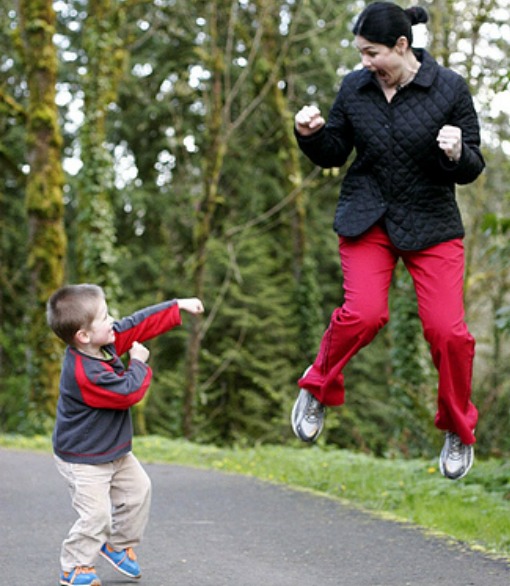What Makes a 21st Century Mom?
Not an easy answer. But here are 10 recent studies on what it means to be a mother today
/https://tf-cmsv2-smithsonianmag-media.s3.amazonaws.com/filer/Mother-Child_face_to_face-header.jpg)
It’s never been easy to be a mom. I don’t speak from personal experience, of course, but my mother had eight kids and, as I remember it, that was no slice of heaven.
You could make the case that all the technology we now have, all the whizzy whiz conveniences have made the job easier. But with that has come a pace that can be equal parts maddening and discombobulating.
So what does it mean to be a 21st century mom? You got me. But maybe science can provide some clues. Here are 10 of the latest studies and surveys on modern motherhood:
You’re giving me a big head: Of course, most moms nail the nurturing thing, but who knew it made their kids’ brains bigger? Or at least it does to the hippocampus, the part of the brain associated with learning, memory and response to stress. According to a new study at the Washington University School of Medicine in St. Louis, children who had been nurtured more by their mothers in a stressful situation when they were toddlers tended to develop a larger hippocampus by the time they reached school age.
Moms will be moms. Photo courtesy of Flickr user Sean Dreilinger
Not to mention there’s never a toilet seat issue: It shouldn’t come as a big surprise, but now scientific research backs it up: As they approach middle age, mothers shift their focus from their husbands to their adult daughters. And that relationship deepens, peaking when the mom reaches 60, concludes the study published last month in Scientific Reports. The researchers said a mother’s ties to a daughter begin to strengthen when she, the daughter, reaches childbearing age.
He’s not overweight, he’s under tall: A report published in this month’s issue of Archives of Pediatrics and Adolescent Medicine discovered that an overwhelming majority of mothers in a recent study thought their overweight babies were the perfect size. And more than 20 percent of the mothers whose babies were an ideal weight thought their kids should be bigger.
She’s such a digital diva: Lose the notion that moms are behind the digital curve. A survey of more than 2,500 mothers, done for BabyCenter, found that almost two-thirds of them were using smart phones and that they were 28 percent more likely than the average person to own a digital tablet. Plus, they’re 50 percent more likely to watch video on the Web compared to the general population. And now one out of three bloggers are moms.
And she’s on that Facebook all the time: And another study, this one of 3,000 Americans, concluded that mothers are more likely to visit Facebook daily than other women (85 % to 73 %) and are also more likely than other women to buy something based on a recommendation on a social network (42 % to 29 %). “Moms continue to take advantage of the little spare time they have by utilizing all the tools at their disposal. This includes their mobile devices and social networks,” said Daina Middleton, CEO of Performics, the company that commissioned the survey.
When it’s good to get a fuzz on: That memory loss, stress and fuzzy-headedness that a lot of women experience during pregnancy? Well, a recent paper contends that it’s all part of the process of prepping them to be mothers. Psychology professor Laura Glynn argues that some of the worst parts about pregnancy—vague but nagging cognitive and memory lapses—may actually be side effects of the mental shifts that happen as a woman becomes a mother. She may be losing her memory at the same time she’s learning to bond with an infant.
You gotta problem with slaving over a hot stove?: If British men truly reflect their gender, a lot of sons would rather eat their mother’s cooking than their wives’. More than half of those questioned in a survey said they preferred their mom’s meals, and roughly a third said they thought their mothers took extra time and care cooking, while they felt their wives were more likely to dish up prepared food.
Live long and propagate: The more children a mother has, the longer she’s likely to live, according to a recent study at the University of New South Wales. Women with six or more children were found to be 40 percent less likely to die during the study’s follow-up period than women with no children, a likelihood that apparently increased with each child they bore. The researchers admitted that they did not really know why this was the case.
Go north, young woman: In case you wondered, the best country in which to be a mother these days is Norway. At least that’s what Save the Children concludes in its annual State of the World’s Mothers report. Its research showed that Norway does well across the board in terms of how mothers fare, from having a “skilled attendant” present at the birth of every child to the high level of education for women to the average life span of Norwegian women–83. Rated last is Niger, a country where almost every mother has at least one child die before their fifth birthday. The U.S. ranks 25th out of 165 countries.
Surely you jest: And finally, this report out of Chicago: A new study found that almost as soon as they’re born, babies can tell if their mother’s a loser. “From the moment they open their eyes, newborns can tell if their mother had no other options and was forced to settle for their father,” said researcher Dr. Stuart Lindstrom. Nah, just kidding. A little slice of The Onion.
Video bonus: It’s just a few years old, but already it’s a Mother’s Day classic: Mr. T, in very short camo shorts and pounds of non-camo jewelry, raps a no-nonsense “Treat Your Mother Right.”
That’s an order.
/https://tf-cmsv2-smithsonianmag-media.s3.amazonaws.com/accounts/headshot/randy-rieland-240.png)

/https://tf-cmsv2-smithsonianmag-media.s3.amazonaws.com/accounts/headshot/randy-rieland-240.png)